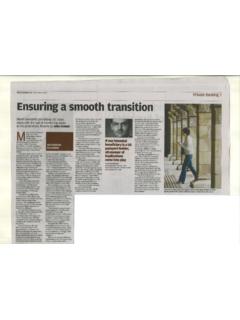Transcription of Handing over the helm - Family Legacy Asia (HK) Limited
1 1 Tuesday March 27 2007 Handing over the helm An effective exit strategy carries many benefits, but is often a thorny issue for Hong Kong's business clans, writes Chris Davis FEW BUSINESS OWNERS like to think about the time they will no longer be at the helm of their companies. After putting in years of blood, sweat and tears to ensure a successful enterprise, the idea of planning an exit strategy can seem unimaginable. For Family -run companies in Hong Kong, the axiom that 'those who fail to plan, plan to fail' is frequently true when it comes to succession planning. According to Christian Stewart, head of Wealth Advisory Group, JPMorgan Private Bank Asia-Pacific, feedback from presentations and seminars suggest that while many Hong Kong business owners are aware of the need for succession planning, many fail to do anything about it.
2 'Probably less than half of the people we talk to have made any effort to put into place a meaningful succession plan,' Mr Stewart says. A succession plan is usually a written document that provides for the continued operation of a business in the event that the owner leaves the company, retires or dies. The document details the changes that will take place as the leadership of the business is transferred from one generation to the next. Succession planning agreements normally outline what will occur when it comes to allocating shares of stocks, assets and other financial considerations. The plan can also include provisions for a Family Council arrangement, which allows Family members to make decisions on issues such as philanthropy. Mr Stewart says a well-structured Family Council arrangement can often deflect possible disagreements by involving Family members in areas not directly linked to running a business.
3 A succession plan should also address Family issues, not just for the immediate next generation but also for generations to come. An appropriate business successor is not necessarily the person with the best track record and abilities. There are other factors such as Family membership and expectations to consider. In the case of small or Family -run businesses, succession plans are often known as continuity plans, since without them the businesses may cease to exist. The benefits of a well-thought-out succession plan are many. Such a plan can help a business retain key employees and maintain the value of its stock and assets during a management or ownership transition. A smooth transfer of leadership can also help to maintain long-established relationships with landlords, trading partners, suppliers 2 and distributors.
4 A succession plan can also help a business owner retire in comfort and continue to provide for Family members who may be involved with the company. In Britain, a 2005 survey conducted by the Association of Chartered Certified Accountants found that about 30 per cent of small-business closures were the result of a lack of effective succession plans. A similar study carried out by the US Small Business Administration in 2005 found that about 90 per cent of the 21million small businesses in the United States were Family -owned, but only 30 per cent of Family -run companies succeeded into the second generation, while only 15 per cent made it to the third. Usually, the lack of a solid succession plan was to blame. As businesses pass from one generation to the next, the succession plan becomes increasingly complex.
5 Like many other mature business environments, Hong Kong Family businesses follow the classic model of founder, sibling partnership and cousin consortium, which can involve 30 or 40 stakeholders. Hong Kong wealth advisers generally recommend seeking professional succession advice when a business or assets are worth about US$2 million. Despite the many benefits of having a succession plan in place, many business owners simply neglect to develop one, says JPMorgan's Mr Stewart. This oversight may occur because the business owner does not want to confront his or her own mortality, is reluctant to choose a successor, or believes that no one else is capable of running the business. Mr Stewart presented a hypothetical case of the owner of a company suddenly dying: the wife and Family of the deceased would need to continue receiving income from the company, just as they did before the owner's death, but problems could arise if there was no plan for continuing compensation.
6 There could also be problems in the case of partnerships without a succession plan. 'Far too often, when the exit strategy has not been defined, the lawyers become involved, and that's when the horror stories begin,' Mr Stewart says. 'Without a succession plan in place, the situation can break down into a 'where's mine?' or 'he said, she said' situation, with no firm ground for anyone to stand on.' Often Family members not directly involved in the business continue to receive financial benefits or benefits in kind, so it is important that these arrangements are understood and kept. 'Decisions need to be made with the head and not the heart,' Mr Stewart says. It is important that all Family members are involved with the succession plan, including those who will play no part in running the business.
7 3 Mr Stewart believes that business owners should raise succession planning issues with honesty and understanding, rather than forcing people to guess. Ignoring succession matters can increase anxiety levels. He recommends that succession plans be initiated at least five years before a business owner plans to retire. Experts say the succession planning process, ideally, should begin when the business owner is between 45 and 50 years if he or she plans to retire at 65. Because succession can be an emotionally charged issue, the services of an impartial professional adviser may be sought to ensure a smooth transition. Developing a succession plan can take more than two years, and implementing it can take up to 10 years. No two succession plans are the same, so the plan should be structured to fit the specific situation and goals of each Family and company.
8 Once a succession plan is agreed upon, concerned parties such as accountants and lawyers assisting in the Family business should be informed of the arrangement. Armed with a copy of the succession plan, these professionals can help turn desires into reality by applying their skills to create strategies, tactics and tools to make the succession plan work. Mr Stewart says professional advisers can help a business owner understand the value of a business beyond its monetary worth. This value can lie in what the business means to Family stakeholders, business and trading partners and the wider community. Professional advisers can also help set up a trust, act as Family mediators, formulate Family management strategies, map out arrangements for a Family Council and advise on philanthropy issues.
9 'Succession planning is not a nice-to-have,' says Phil Neilson, chief executive of The Henley Group, 'it is a necessary part of any organisation's ability to reduce risk, create a proven leadership model, preserve organisational memories, smooth business continuity and maintain Family relationships. 'I always start by asking several questions,' Mr Neilson says. 'The first would be how much of the person's net worth is tied up in the business. Then I would explore the owner's feelings about the prospects for the continued success of the business. Many owners worry about causing Family disagreements or the next generation's ability to maintain the business. From a financial planning perspective, is it wise to have such a large percentage of the owner's net worth tied up in the business?
10 Are there options out there to diversify?' If the business owner plans to retire, his or her retirement finances should not be entirely tied up in the business; funds and investments should be diversified. The distribution of finances to Family shareholders should go smoothly, and not put a financial burden on the business. Mr Neilson suggests changing the tone of the succession planning arrangement in the case of concerned parties frustrated over a general unwillingness to get into discussion about succession plans. 'A lot of times there is a perception that the younger Family member is trying to 4 prove to the parent that he or she knows more about the business than the patriarch,' Mr Neilson says. 'Shift to a more inquisitive tone. Ask some questions in terms of what the founder hopes his Legacy will be, or what the next generation would like to achieve through the business.










